Peter MALONE
Saturday, 18 September 2021 19:52
Jodorowsky's Dune

JODOROWSKY’S DUNE
US/France, 2013, 90 minutes, Colour.
Alejandro Jodorowsky, Brontis Jodorowsky, Michel Seydoux, H.R.Giger, Chris Foss, Christian Vander, Devin Faraci, Diane O' Bannon, Drew Mc Weeny, Gary Kurtz, Jean- Paul Gibon, Jean- Pierre Vignau, Nicolas Winding Refn, Richard Stanley.
Directed by Frank Pavich.
For the film buffs who experienced films in the 1960s and 1970s, and for those who appreciate the history of cinema, this is an essential film, a portrait of Chilean director Aleyandro Jodorowsky and an illustrated lecture on the director himself and his career. At 84, he is a vigorous and intelligent participant in the film, responding eagerly with passion to questions about his career. He is a commanding presence.
The focus on of the film is on his attempt to make a movie of Frank Herbert’s Dune in the 1970s. Everything seemed to be in place after a long and painstaking pre-production effort. He and his producer, Michel Seydoux, who had brought the directors films to France with great acclaim, went to, shop the screenplay at all the Hollywood studios. They Were commended for the completion of such a planned project, but were wary of the director himself and his reputation and all turned down Dune.(Ironically, the de Laurentiis company greenlit a project in the early 1980s with David Lynch, whom Jodorowsky admired, directing – and we see Jodorowsky amusingly explaining how we went to see the film and had great contentment to find that he thought the film was awful!).
This documentary stands as a very interesting portrait of Jodorwosky, originally from Chile, maker of provocative films in provocative style, especially El Topo and Holy Mountain, both of which were screened in Australia shortly after their release. These are considered as the first of the Midnight Movies, finding a home in the United States for these late night screenings. Jodorowsky himself says here that he did not urge audiences to take LSD but wanted to provide films which offered the visual equivalent of an LSD experience with hallucinations. And he succeeded. The next step was to make Dune, which he saw as a prophetic novel – even though he changed some of the plotlines and situations according to his own prophetic interpretation. Jodorowsky is not above seeing himself as rather Godlike.
The film makers here have scored many a coup, gathering together most of the chief collaborators for Dune, and interviewing them. One, writer-director, Dan O’ Bannon, who had sold up everything in the United States and moved to Paris to work on the project, had died but there were visuals of him and an interview with his widow. Together, they explain how they saw their task in bringing Dune to visual life, with illustrations of many of their designs.
After the disappointment of Dune’s demise, many of these collaborators worked together, for example, Dan O’ Bannon and H.R.Geiger created Alien. There is very interesting section here with sequences from many of the signs-fiction films from the 1970s which were directly influenced by the planned Dune – since the quite large book compiled by the director was available at all the studios.Jodorowsky himself worked with the artist, Möbius, especially with a number of what are now called graphic novels.
This is exemplary filmmaking, keeping audience interest, moving at a great pace, introducing a variety of characters, insightful explanations of the creative process, interviews with Jodorowsky’s son, Brontis, who was to be Paul Atreides in Dune, as well as the commentary from the director himself right throughout the film.
It is some consolation that he directed a film. The Dance of Reality with his son which was screened at the Cannes film Festival 2013.
Published in Movie Reviews
Published in
Movie Reviews
Tagged under
Saturday, 18 September 2021 19:52
20,000 Days on Earth
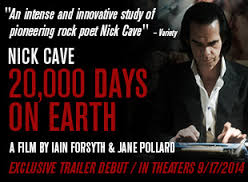
20,000 DAYS ON EARTH
UK, 2013, 97 minutes, Colour.
Nick Cave, Suzie Bick.
Directed by Iain Forsyth and Jane Pollard.
The credits of this documentary on Nick Cave and his career start with a counter at zero. It then begins to move rapidly, very rapidly, through the numbers until it reaches 19,999. And all the time, there is an even more rapidly changing, large of photos from Nick Cave’s life.
This is an imaginary, but realistic, day in the life of Nick Cave – his 20,000 day. For many years he has lived in England, on the coast in Brighton, where he feels comfortably at home. He has a wife and children. From this domestic base, and we see him getting up in the morning, we see his relationship with his family and his admiration for Suzie and her support and advice. At the end, we see him relaxing with the children.
His day is very busy including a number of visits, especially to his collaborator Warren Ellis, an eccentric but attractive character. Inserted is a sequence with Ellis and some French children doing background singing. He also visits his archive, some rooms with an archivist at work, going over various documents, pictures, so that there is a record of Cave’s career to live on after him.
There are any number of flashbacks, and many scenes showing Cave at work, by himself, writing in his notebook, lyrics for his songs, scribbled and crossed out. We see him at his piano and his composing. There are many scenes of performance with his group, the Bad Seeds, and, towards the end, a full blast concert at the Sydney Opera House. Throughout the film there is work in composition, performance of Push the Sky.
Cave has an inner intensity which manifests itself in his response to the interviewers, revealing quite a deal about himself, his early life in the Victorian countryside around Wangaratta, the affirmation of his father, his moving into music, the 1980s which he says he largely forgets, a decade of drug-taking in Australia and in Berlin, where he did much of his work in composition.
For those who appreciate Cave and for those interested in how he came to achieve the status he has, there is a great deal of personal detail as well as response from various people, some of whom suddenly appear in the car which he is driving and join in conversation, Ray Winstone (although the connection is not very clear why Winstone is there), former Bad Seeds musician, Blixa Bargeld, and an invigorating conversation with Kylie Minogue.
A disappointment for those interested in cinema is that he does not give any information about his writing for the screen, for his friend John Hill coat, and the films The Proposition and Lawless. Given his busy music schedule, one wonders how he fitted in the writing of screenplays.
For those interested in music, for those who wonder about composers and how they work with their creative processes, and definitely for those interested in Nick Cave and his career, this is both an interesting and entertaining documentary.
Published in Movie Reviews
Published in
Movie Reviews
Tagged under
Saturday, 18 September 2021 19:52
Locke
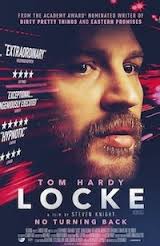
LOCKE
UK, 2013, 89 minutes, Colour.
Tom Hardy, voices of: Olivia Colman, Ruth Wilson, Bill Miner, Tom Holland, Andrew Scott, Danny Webb.
Directed by Stephen Knight.
Locke is an evocative name for this film because the audience, in a sense, is locked into one place for the whole 90 minutes. For those philosophical bent, they might wonder whether the title comes from David Locke. And the place where the central character and the audience are locked is in a car, moving along an English Motorway one evening.
The film has been written and directed by Stephen Knight, prominent writer for such films as Eastern Promises, Dirty Pretty Things, Hummingbird. Interestingly, reviewers who like his tough films neglect to mention that he wrote the screenplay for the immensely popular The Hundred Foot Journey.
The film opens at a huge building site which we learn is to have a record-breaking quantity of cement to be delivered for a precision pour the next morning. We learn also that the supervisor, Ivan Locke, is driving away from it. He gets into his car as does the audience, the director skilfully moving the camera within the car, looking into the car from outside, as well as showing the flowing traffic, the speed and slowing down, eliciting a sense of our being passengers with Ivan Locke.
What is interesting is the drama that Ivan is involved in, the several decisions he has to make, the growing tension because of these decisions.
The main reason that he is driving to London is that a woman that he was associated with but did not really know is about to give birth to his child. It is premature. She wants him to be present at the birth for support and security. This means that, because his wife does not know, he has to tell her the truth and experience the consequences. The complication here is that he has two sons. But Ivan Locke is a good man, a man of principles, someone who tells the truth and is prepared to accept what follows from the truth.
But what makes for further dramatic tension is his driving away from his responsible work at the building site.
What connects all these decisions is the phone in his car. His journey is filled with phone calls, calls he makes as well as calls to him. He treats most of them in a very calm way because that is his personality, but the pressure on him is enormous.
Taking it for granted that he is hurrying to the birth, the anxiety is about how the woman will cope, with phone calls from the nurse and from her doctor, explaining the necessity for Caesarean surgery. Our emotional concern is how his wife responds and the contact with his sons who are watching a football match on television. The responsibility tension is his contact with two of the men who will be participating in the pouring of the cement, a supervisor who contacts the bosses of the International Corporation in Chicago who, to say the least, are not pleased. The other man is on the spot, and Ivan has to get him to make sure that the organisation for the pour, the stop-go action in the surrounding streets is organised (with complications from the police who want a signature with only 25 minutes to get it, finding the phone number of the local councillor, contacting him at a restaurant to ensure that all is in order). The man on site has been drinking, initially denying it, and Ivan has to get him to ensure that everything is ready, which includes his running to another building site and enlisting the help of some extra expertise.
Quite some action off-screen.
This ensures that we have 90 minutes of personal drama as well as industrial drama.
It is to the credit of Tom Hardy (who has become very popular in films in the UK as well as internationally and is to be the new Mad Max) that audiences are engaged with him, sympathise with him, hope for him… It is a very effective performance, all the more so because of his sitting at the steering wheel for the whole of the film.
The film also has strong British voice talent for those at the other end of the phone: Olivia Colman as the pregnant woman, Ruth Wilson as the wife, Bill Miner and Tom Holland as the boys (the final phone conversation with one of his sons indicates that there might be some hope), Andrew Scott (Moriarty in the Sherlock television series) as the man on the spot.
Audiences might not be in the mood for watching this kind of confined drama, but it is well worth watching.
1. Audience interest? The specialist and experimental film? Acclaim?
2. The title, the focus on Ivan Block? Tom Hardy’s performance? The fixed location? The voices on the phone? His imagining his father? Dialoguing with him, the antatextgonism?
3. 90 minutes in the car, the technical aspects of the film, the interiors, exteriors, the motorway at night, the traffic, the speed? The phone as the focus? The editing and time pace for calls and in-between calls?
4. Ivan’s situation, the building site, big, the cement trucks coming the next morning, a record for Europe, his leaving the site?
5. Bethan, her phone call, her pregnancy, her giving birth early, her fears, the story of their meeting, her age, his celebrating the building site, her being alone, their drinking, Ivan happy, sorry for Bethan, the sexual encounter? Not knowing of her pregnancy, her wanting him to come, his saying that he did not know her, the impossibility of saying that he loved her?
6. At home, the boys, watching the football match, his wife, expecting him, her reacting to his past, his always being busy? Telling her the truth? Her hanging up? Anger, grief? with the boys? In the bathroom, weeping? Her pettiness in refusing to give him the important phone number?
7. The building site? The prospects for the next morning? Gareth, his demands, trying to get Ivan to come back? Contacting Chicago, corporate bosses, firing him? Gareth having to handle the situation?
8. Donal, his being on the site, his anxiety, drinking on the site, getting drunk, his denials? Ivan’s phone calls? The need to contact the police about traffic? Donal getting the number? Ivan having the file in the car? Reassuring Donal, his reactions? Loyalty, not wanting to be rebuked, Ivan getting him to contact the Polish man and his assistants, urging him to run, Donal’s reaction to the running, finding the Pole, getting him into the car? The money? All ready for the delivery of the cement?
9. Phoning the police, their wanting a signature? The Stop-go situation for traffic? Ringing the restaurant, the councillor and his being uncooperative, Ivan and the pressure, his agreeing?
10. Audience, tension about the site, the details to be fixed up, the insight into Ivan, a good man, a man of principles, man of the truth? Accepting responsibilities?
11. Bethan, the nurse calling Ivan, the doctor calling him, Ivan admitting only that he was the father? Bethan and her fear, the windows open, her pain? Ivan and his advising her to follow what was suggested? The Caesarean? The doctor’s explanation? The birth of the child and Ivan hearing him over the phone?
12. The boys, the importance of the young boy calling his father, talking about the football, planning to watch the replay the next day? Key for some kind of expectations and hope?
13. Ivan arriving at his destination, so much lost in his life, but a good man who would try to make good?
Published in Movie Reviews
Published in
Movie Reviews
Tagged under
Saturday, 18 September 2021 19:52
Poetic Justice
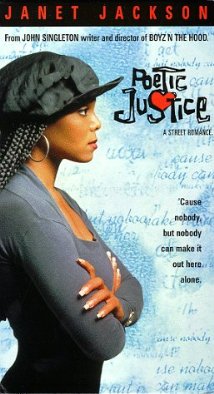
POETIC JUSTICE
US, 1993, 109 minutes, Colour.
Janet Jackson, Tupac Shakur, Regina King, Maya Angelou.
Directed by John Singleton.
Poetic Justice is the second feature film by African- American director, John Singleton, who made a breakthrough the year before with Boyz in the hood. Was to go on to make Higher Alerting, Shaft, Four Brothers. He was in preparation for a film, Tupac, based on the life of the wrapper.
This film was also a star vehicle forward Janet Jackson. While she was to continue her career as a singer, it did very little for her film career, even earning her a not undeserved Razzie nomination as worst actress of the year.
But, whatever the quality, the film is interesting as a star vehicle for Tupac Shakur who was to be murdered in 1996 at age 25., which meant that he appeared in few films, Juice, Gridlock’d, Gang Related. But there were several films about him and his death, The case was studied in Nick Broomfield's Biggie and Tupac.
Some American bloggers have found this film interesting and to their taste. Others may find it very distant, a 1990s picture of Africa- Americans in Los Angeles with not such interesting characters and interactions. The film is slowly-paced. And while there is some drama, especially a brawl and a murder at the beginning, it is more sedate that might have been expected.
The film opens curiously at a drive-in with a melodrama screening starring Billy Zane. The action then moves to Justice, Janet Jackson, and her boyfriend who is then picked on by a group and killed in a brawl. Justice, writes poetry, gives up her studies and decides to be a hairdresser in the city. There she meets a number of potentially interesting characters, the stylish owner of the shop, the gay friend, the other members of the staff, the customers.
One of the staff, played by Regina King, persuades Justice to go with her on a trip to Oakland and a Festival in a mail truck. Regina King is going with her husband – lovey-dovey at times, quarrelling at others. But the driver is someone Justice has encountered before, and not in a friendly way. She is petulant, argumentative, gets out of the truck but is persuaded to continue. As she continues to talk, she finds that she and the driver have more in common that they thought. Audiences have seen the driver with his wife, their clash, his walking out and taking a child with him.
Justice continues her poetry. In fact, the poetry was written by famed Maya Angelou, the celebrated poet, who appears here as Aunt June, who has a lot of wise words to say about the self-centredness of the younger generation and of undisciplined children – something which is continually relevant.
One of the difficulties with Janet Jackson’s performance for many audiences is that she is continually chewing gum, which does not quite tie in with her image of being sensitive and our poet.
This is a picture of a particular time and place, a time of crisis, just after the Rodney King riots. In that sense, it is interesting to view in retrospect, while not being as interesting or is entertaining as might be hoped.
Published in Movie Reviews
Published in
Movie Reviews
Tagged under
Saturday, 18 September 2021 19:52
Trainwreck: My Life as an Idoit/ American Loser
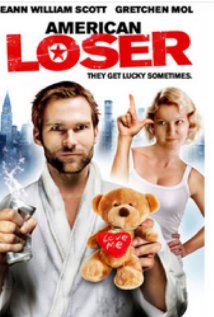
TRAINWRECK, MY LIFE AS AN IDOIT/AMERICAN LOSER
US, 2007, 94 minutes, Colour.
Seann William Scott, Gretchen Mol, Deirdre O' Connell, Kevin Conway, Jeff Garlin, Denis O' Hare.
Directed by Tod Harrison Williams.
Trainwreck is an effective star vehicle for Seann William Scott, best known for playing slackers, especially Stiffler in the American Pie series. He plays Jeff Nichols, a man who has quite a number of personality difficulties including attention deficit syndrome, dyslexia, two reds Syndrome, lack of physical balance, alcoholic.
While there are flashbacks to explain Jeff’s condition as well as his dependence on his mother and the support of his stepfather, most of the action is in the present, Jeff recounting his stories to a variety of groups. Is also an ex-alcoholic, but has been dry for 10 years, even serving as a mentor for his friend, Lenny. Present at many of the meetings is Lynn, who involves him in a sexual relationship even though she is engaged to a wealthy, older man.
Jeff remembers his past and the various wrecks in his life. And, in the present, he has an episode where he goes for a month-long voyage with fishermen but wants to throw the fish back. He has ambitions to work as a stand-up comic. And then he burns his mother’s house down.
Nevertheless, he survives and is seen at the end doing the stand-up comedy, as well as writing a book.
1. The title, its tone? The original book been called The Little Yellow Bus?
2. The film based on a true story, the glimpses of Jeff Nichols at the end with stand-up comedy? The final optimistic hope?
3. The focus on Jeff, Seann William Scott’s performance and screen presence? His narrative, at all the AA meetings, his sharing his story with the group, focusing on the audience? Finally finding some humour in his story, especially the burning down the house, for his comic career?
4. His memories of his childhood, his dependence on his ‘mummy’, her loving him, the scene with the catching of the fish and throwing it back, fishing as peaceful for him? His mother marrying Mike? Mike and his providing the house, writing the cheques, his being a good stepfather?
5. Jeff as an alcoholic, dry for 10 years, the flashbacks to his drinking, sinking his stepfather’s ship and coming ashore with the cans, his driving and his drinking? Going to the AA meetings, stopping drinking? The angry outburst at the AA meeting and his leaving?
6. His mental difficulties, the touch of Tourette’s Syndrome, his lack of balance (and his falling over when seeing the label on the runners), dyslexia, inability to read? His dealing with these, sometimes well, sometimes fatally, for example, his lack of control in the classroom, the discussions with the principal and his being fired? His inability to hold a job?
7. The fishing trip and his inabilities and throwing the fish back?
8. His friendship with Lenny, Lenny and his drinking, giving it up, being a mentor, Lenny dependent on him, wanting to keep contact, Jeff ousted from his quarters, (clapping during the night with his nightmares, not paying the rent), going to stay with Lenny, upper bunk, the conversations? The two wandering the streets, seeing the Comedy Club, Lenny and his memories of karaoke but fearing that he would want to drink? Lenny and his observations about Lynn? Lenny and the karaoke and his success?
9. Lynn, at the meetings, knitting, approaching Jeff, taking him home, the sexual encounter, the truth about her sugar-daddy, his being away? Her singing and her wanting to be a singer? Continually meeting with Jeff, their talking, going to her apartment, each of them in love, but the problem of Terry? Her pregnancy, not knowing who was the father? Not wanting to go on the boat, going fishing on the wharf – the final caption saying that the relationship did not work out?
10. Jeff and his dependence on his mother, her being good to him, kind of smother-love? Mike, a good man, helping Jeff?
11. His going to the house, the heater, the electric wiring, the house burning down, his owning up so that the electrician would not be blamed? Mike and his accepting of the reality, giving him the key to sit in the car?
12. Telling the story of the house burning down, everybody laughing, the transition to the Comedy Club, his mother and Mike being there and supporting him?
13. Jeff’s life as something of a train wreck, but not always an American Loser?
Published in Movie Reviews
Published in
Movie Reviews
Tagged under
Saturday, 18 September 2021 19:52
Family Weekend
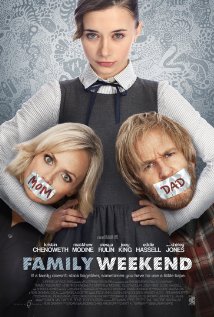
FAMILY WEEKEND
US, 2013, 105 minutes, Colour.
Kristin Chenoweth, Matthew Modine, Olesya Rulin, Joey King, Shirley Jones, Eddie Hassall, Chloe Bridges, Adam Saunders, Robbie Tucker.
Directed by Benjamin Epps.
Family Weekend seems something like an extended pilot for a television show about a dysfunctional family.
The focus of attention is on Emily (Olesia Rulin) who is an obsessive about neatness, punctuality, her sport of rope-jumping at which she excels. She has made notes for her parents to attend the sport but everybody has an excuse. When she arranges a dinner, she drugs her parents, ties them up and submits them to a course on better parenting. She involves her brothers and sister in the interrogation, the older brother (who pretends to be gay in order to get his parents attention) makes a documentary of the process, the sister, who is in love with movies, especially Jodie Foster in Taxi Driver, is put in charge, while the younger brother has a capacity to remember and to be able to quote statements from the parents which condemn them.
The proceedings are rather farcical but entered into with zest by the cast.
The message is rather obvious that parents should not be so preoccupied with themselves and their jobs that they neglect their children and that the children need love and attention.
It all ends well even if our heroine is taking control of classes in a juvenile correction facility.
1. A comedy about a family – a comedy for a family?
2. The Michigan settings, the town, the school, the athletics, homes, the police? Musical score?
3. The irony of the title? Emily and the family, the setup, the effects?
4. The story like a pilot for a television series? The characters, real with the touch of caricature, interactions, crises, the over-heated action, police intervention? But a happy ending?
5. The focus on Emily, obsessive, her rope-jumping, practice, her slips around the house for her family? At school? Alone in the cafeteria? The way people reacted to her? The competition, her family’s absence, her neighbour and her smart retorts, driving her home?
6. Emily contacting each member of the family about their absence: Lucy and her preoccupation with movies, trying to be Jodie Foster in Taxi Driver? Mikey, young, his ability to memorise everything? Jackson, his room, the gay touches, his wanting to make films, his commercials? Duncan, the artist, not completing his work, self-preoccupied, against competitive sport, vegan? Samantha, business, arriving home, continual talk on the phone, deals? Emily and her exasperation? The grandmother and helping, Samantha's antagonism, her return to help?
7. Emily arranging the dinner, forcing everybody to sit at the meal, the interactions? The drugged wine? Tying up her parents? The project, her notes, the speeded up camera work for her exercise practice, consulting the books and references? With the parents, taking them through the questions, their getting the answers wrong? Gagging them?
8. Persuading Jackson, wanting to be called Thor, to film it all and make a documentary, his enthusiasm? His being exposed as not being gay, but feeling that this was the only way to get his parents to pay attention to him? Lucy and her liking being in control? Mikey and his giving the information and quotes?
9. Ricky and his arrival, implications for Samantha, his being hit on the head, tied up, hidden in the room, getting the pill from Lucy, being high, his performance in front of the police, saying there was no relationship with Samantha, getting away?
10. Kat arriving home, the glamorous touch, observation, her phone, putting the video on the net?
11. Duncan and Samantha and their trying to do deals? Emily and her plea for them to be normal people? The arrival of the police, the parents covering up,
the smooth talk with the police, their perseverance, Ricky’s intervention?
12. The young journalist, injuring Emily, photographing, giving of the DVD, arrival at the home, the wrong times, his turning up again, the family pretending to watch the DVD?
13. Emily going to school, preparing for the competition, her amazement that her parents turned up? Her being arrested, in the correctional facility, training the other inmates?
14. The farcical touches – but the real message about family?
Published in Movie Reviews
Published in
Movie Reviews
Tagged under
Saturday, 18 September 2021 19:52
Step Up All In
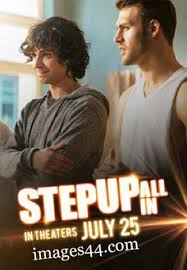
STEP UP ALL IN
US, 2014, 112 minutes, Colour.
Ryan Guzman, Briana Evigan, Adam Sevani, Mari Koda.
Directed by Trish Sie.
It is about eight years since the first Step Up film was released to great enthusiasm, offering an opportunity for Channing Tatum to dance and for Rachel Griffiths to have a serious role. But that seems a long time ago. However, it is not that the dancing has been out of mind with several sequels, Step Up 2: The Streets, Step Up 3D Revolution. There has been no abatement of dancing and competitiveness.
So, what is left? The old group have come from Miami to Los Angeles for auditions, led by Sean (Ryan Guzman) who was in the last film. During the opening credits, there is quite an amount of dancing as a panel are looking for a particular dancer – there are all kinds of characters, all kinds of costumes, all kinds of movement during this opening sequence. But, the group does not win, because it seems that the result was rigged from the start.
They are glum for a few minutes and then intend to go back to Miami but Sean becomes full of enthusiasm and decides that the group should come back together again because he has discovered that there is a significant competition in Las Vegas. He meets Moose, from the previous films who connects him with some of the dancers and introduces him to Andie (Briana Evigan) from Step Up 2. They click and one does not need to be prophetic to know that romance will be in the air.
Off to Las Vegas, some scenes of rehearsing, then a performance by the rival group and then themselves who are now called LMNTL (elemental!). Since this is halfway through the film, both groups go into the finals, so that there will be have to be a competitive finale (and there is).
But, since this is only halfway through the film, there has to be some drama as well and Sean and Andie fallout, she not trusting him when he asks her to be lifted by him and then do a complete somersault with him catching her and lowering her to the floor. Off she goes. Fortunately there is an old couple with a history of dancing and they have a good talk to Sean enabling him to discern that an apology is in order.
So, for the rest of the film, Sean gets the group together again, Andie decides to return, they go to Las Vegas, participating in the competition with an extraordinary blend of acrobatics and mime and dance (though the timeline of the film does not seem to give them any time for rehearsal to achieve this kind of success). And, of course, that somersault destined for great applause. The compere has been backing the other group behind the scenes but there is nothing like audience acclaim for our group to win absolutely.
And the prize was worth dancing for, a three-year contract for them all in Las Vegas. Were this reviewer a screenwriting type, he would already have the screenplay for Step Up Las Vegas well underway.
1. The popularity of the series? Some continuing characters? Progress of the dance group?
2. The audience, love of dance, modern style, mime and acrobatics? Individuals? Group dances?
3. The film as colourful, costumes, sets, 3D?
4. The musical score, the songs?
5. The conventions and audiences familiar with them, expectations? The dances, auditions, the hard work, failure, entrepreneurs and their vision, leadership, the troupe, competitiveness, the Vortex, Success? The plotline aspects: enthusiasm, failure, new beginnings, fallouts, wise advice from elders, apologies, the group working together, the declaration that winning was not important but participating? The win, the contract for three years? Fulfilling expectations?
6. The credits, the auditions, the variety of performance and dance styles? The panel, the judgements, their observations? The winner?
7. The disappointment, the decision to go back to Miami, Sean and his hearing of the competition in Las Vegas? The new group? Andie and her enthusiasm? Finding Moose, the Chinese girl, the twins?
8. The rehearsals, the experience, the locations, the creativity with the dancing?
9. The old couple, loving each other, memories of dance, dancing together, liking the young people, giving advice?
10. The rival group in Las Vegas? Each getting into the finals? The compere, her glamour, yet her favouring one group over the other?
11. Jealous moments, together, apart, Sean and Andie? His wanting her to do the leap and her having to trust?
12. Sean following the advice of the old couple, apologising, to the group, Andie turning up?
13. No time for rehearsal but putting on a spectacular show? In comparison with the rival group? The compere and her wanting to rig the results? The audience enthusiasm and participation? The fact that Sean had said it was not important to win but to participate? And the climax with Andie doing the somersault and his catching her? Exuberance? The rivals surprised?
14. Winning, the three-year contract in Las Vegas – and any more possibilities for further Step Ups?
Published in Movie Reviews
Published in
Movie Reviews
Tagged under
Saturday, 18 September 2021 19:52
Million Dollar Duck
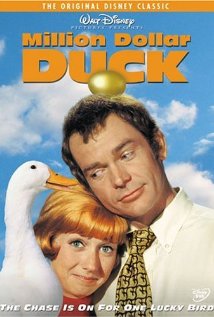
THE MILLION DOLLAR DUCK.
US, 1973, 89 minutes, Colour.
Dean Jones, Sandy Duncan, Joe Flynn, Tony Roberts, James Gregory, Lee Harcourt Montgomery, Jack Kruschen, Arthur Hunnicut.
Directed by Vincent Mc Eveety.
The Million Dollar Duck is a slight live action Disney film from the 70s when this kind of feature was popular. Dean Jones appeared in quite a number of them including The Shaggy DA, The Computer Wore Tennis Shoes. His co-star is Sandy Duncan, somewhat offputting because of her screechy voice. Tony Roberts does a familiar role as a friend who also helps himself to the gold.
Dean Jones plays a scientist whose project includes a duck. The duck is rejected as unsuitable but wanders into the radiation lab and is transformed. In the meantime, he has eaten the applesauce which the professor’s wife has made, making a mistake with the recipe! Their son wants a dog and is crestfallen when they can’t afford it because of the number of bills. However that duck makes friends with the son. And, later provoked by a dog, lays eggs which have gold instead of yolk.
This leads to some humorous adventures, the lawyer friend helping with all kinds of schemes to conceal the discovery, the next door neighbour (Federal investigator) who dislikes his neighbours because of their noise and car fumes, becomes curious as the government officials start an investigation, thinking that the criminals were Mafia. The wife takes the gold to various companies for smelting but they report to the government – which leads to officers arriving, the little boy getting away with the duck in two young men’s reckless car driving, some chases, some crashes – and the radiation effect wearing off, with the prospect of the family getting some profit (after they have paid their taxes on it!).
Direction is by Vincent Mc Aveety, a regular Disney director.
1. A family entertainment, for younger audiences?
2. The Disney treatment, characters, imaginative plot, complications, dangers, chasers, happy ending?
3. The basic plotline, the Professor and his work at the laboratories, the rejection of the duck, the duck wandering into the radiation, having eaten the apple sauce, the professor taking it home, selling it to the old farmer and buying it back with all the ducks wandering out of the enclosure, the dogs barking, the laying of the eggs, the discovery of the gold, keeping it secret, the lawyer friend and his help, buying clothes and cars, the banks refusing the gold, the companies buying it and melting down, phone calls to the government, the government meeting, international problems, the intervention of the President, the neighbour and his discovering the truth, the son running away, the chase, the capture, the radiation wearing off?
4. The family characters, the Professor, bills, love for his family, upset about the duck, bringing it home, his son wanting the dog, his refusal, the duck going to the little boy, the eggs, the gold, his caution, telling his friend, the legal aspects, the inspectors from the government, the search, the chase, and realising that the radiation was wearing off?
5. The mother, her manner, more than a touch ignorant, especially of words? Making apple sauce, the page turning? The issue of her husband’s lunch? The duck eating the apple sauce? Concerned about her son wanting the dog? Realising the duck liked the son? Buying some clothes, going to the bank, the information, going to the companies, telling them that the gold came from the duck and their laughing? The finale and the resolution?
6. Jimmy, wanting the dog, upset, the duck being fond of him, the pet, the eggs, hearing that the duck had to go back? Taking it away, in the car with the reckless drivers, the chase, the duck going to him?
7. The neighbour, his complaints, his wife and her reaction to his looking at the professor’s wife? In the meeting? Spying on the family? Going to court? Ordinary egg?
8. The government officials, the expert and his anguish he received phone calls from Wall Street and other centres, playing down the rumours?
9. The lawyer, friendly, exploitative, buying clothes the car, his smooth talking?
10. The court sequence, the prospects, the ordinary egg?
11. Not untypical Disney live-action film, for an undiscriminating audience?
Published in Movie Reviews
Published in
Movie Reviews
Tagged under
Saturday, 18 September 2021 19:52
Deadly Spa/ Zephyr Springs
DEADLY SPA/ ZEPHYR SPRINGS
US, 2013, 88 minutes, Colour.
Tracey Fairaway, Amy Pietz, Johnny Whitworth.
Directed by Martina Grabiak.
Deadly Spa is a thriller involving dangers for a mother and daughter.
The mother is busy, the daughter edgy, she persuades another to go to a resort which is not only beautiful and comfortable but also offers seminars and exercises. It is presided over by David James (Johnny Whitworth), charming in manner but soon to be seen as the leader of a cult, brainwashing the people who come for renewal, persuading them to depend on him, then emptying their bank accounts and living the luxury life. He is under suspicion when the daughter sees him threatening a young man from the staff whose body she later finds.
The film builds up some tension, a female audience probably identifying with it more, because of the mother and daughter presents and issues.
1. Thriller? Bizarre community? Overtones of the cult?
2. American cities, apartments, gyms, yoga classes? The contrast with the beautiful countryside, the resort, interiors and exteriors? The scenes in the mountains? Musical score?
3. The impact of each title?
4. Kaley and Dawn, the relationship, the daughter’s reaction to the mother, the mother trying to understand the daughter? Dawn and her yoga? Busy? Kaley persuading her to go to the resort? Pooling resources? The prospects of the weekend away?
5. The resort, David, agent appearance, suave and charming? The welcome? The bus, the room, the comfort, the pool, the resources, massages and spas, special sessions, the trips to the countryside, the walks, the beauty, archery, the lunch on the mountain?
6. Kaley and her response, tentative, the friendly staff member? Watching her mother? Jealous or not? Seeing David punish the attendant? Her wariness? Her mother’s fondness for David? The young men wanting to give the note? At the archery, a message that she wanted to be beautiful? David and his persuasive methods? His killing the young man who rebelled and Kaley seeing? Her attempt to leave, finding the dead body? Being taken away, torture, interrogation? Her mother and the escape, their being held together, and binding her mother, getting the bow and arrow, firing at David, ultimately killing him?
7. Dawn, her age, former husband, the work, the holiday, the treatment, responding to it, the attraction to David, his power over her? Puzzled about Kaley? Her not believing her daughter? Kaley’s disappearance, Dawn wanting to phone, David, his lie about the line being down, his quick recovery? Phoning her husband?
8. Kaley and the traveller giving her a lift, David with Dawn in the car, the attack? Kaley and her bow and arrow?
9. The opening, suspicions, the young men driving, the cars coming? Reprised at the end? David and his attack? Mother and daughter surviving?
US, 2013, 88 minutes, Colour.
Tracey Fairaway, Amy Pietz, Johnny Whitworth.
Directed by Martina Grabiak.
Deadly Spa is a thriller involving dangers for a mother and daughter.
The mother is busy, the daughter edgy, she persuades another to go to a resort which is not only beautiful and comfortable but also offers seminars and exercises. It is presided over by David James (Johnny Whitworth), charming in manner but soon to be seen as the leader of a cult, brainwashing the people who come for renewal, persuading them to depend on him, then emptying their bank accounts and living the luxury life. He is under suspicion when the daughter sees him threatening a young man from the staff whose body she later finds.
The film builds up some tension, a female audience probably identifying with it more, because of the mother and daughter presents and issues.
1. Thriller? Bizarre community? Overtones of the cult?
2. American cities, apartments, gyms, yoga classes? The contrast with the beautiful countryside, the resort, interiors and exteriors? The scenes in the mountains? Musical score?
3. The impact of each title?
4. Kaley and Dawn, the relationship, the daughter’s reaction to the mother, the mother trying to understand the daughter? Dawn and her yoga? Busy? Kaley persuading her to go to the resort? Pooling resources? The prospects of the weekend away?
5. The resort, David, agent appearance, suave and charming? The welcome? The bus, the room, the comfort, the pool, the resources, massages and spas, special sessions, the trips to the countryside, the walks, the beauty, archery, the lunch on the mountain?
6. Kaley and her response, tentative, the friendly staff member? Watching her mother? Jealous or not? Seeing David punish the attendant? Her wariness? Her mother’s fondness for David? The young men wanting to give the note? At the archery, a message that she wanted to be beautiful? David and his persuasive methods? His killing the young man who rebelled and Kaley seeing? Her attempt to leave, finding the dead body? Being taken away, torture, interrogation? Her mother and the escape, their being held together, and binding her mother, getting the bow and arrow, firing at David, ultimately killing him?
7. Dawn, her age, former husband, the work, the holiday, the treatment, responding to it, the attraction to David, his power over her? Puzzled about Kaley? Her not believing her daughter? Kaley’s disappearance, Dawn wanting to phone, David, his lie about the line being down, his quick recovery? Phoning her husband?
8. Kaley and the traveller giving her a lift, David with Dawn in the car, the attack? Kaley and her bow and arrow?
9. The opening, suspicions, the young men driving, the cars coming? Reprised at the end? David and his attack? Mother and daughter surviving?
Published in Movie Reviews
Published in
Movie Reviews
Tagged under
Saturday, 18 September 2021 19:52
Hit and Run/ 2012
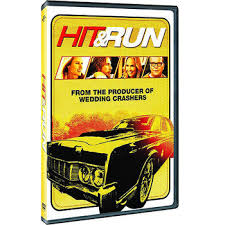
HIT AND RUN
US, 2012, 85 minutes, Colour.
Dax Shepard, Kristin Bell, Bradley Cooper, Tom Arnold, Michael Rosenbaum, Kristen Chenowith, David Koechner, Beau Bridges, Joy Bryant, Jason Bateman, Sean Hayes, Jess Rowland, Ryan Hansen.
Directed by David Palmer and Dax Shepard.
Something in this one for most 30s audiences. The action fans may wonder during the early scenes just what they had agreed to come and see because it is quiet, slow and, mainly, conversation between the central couple, with touches of psychology and philosophy. That means the non or less-action audiences will have something to listen to and think about. Action fans should not worry but relax, listen and think. There will be plenty of car chases later, excitingly filmed and edited.
This means that Hit and Run is not your usual crime thriller nor your average romantic comedy, though it is a romance and thriller.
The dialogue is frequently quite smart (though self-indulgent with dollops of swearing) with talk about love and relationships, about truth and lies. And it has some entertaining plot twists, a gradual revelation about the hero which we might not initially anticipate.
Charlie Bronson (whose real name is Yul) we soon discover, is in a witness protection program in the countryside (his choice of name – but taken from the British movie biography of criminal, Bronson, with Tom Hardy, - it is that kind of dialogue). His officer is an accident-prone Tom Arnold. Annie (Kristen Bell) has left a former partner, whose jealousy complicates the proceedings no end. His brother is a gay policeman (which leads to conversations about glib labeling, stereotyping, homophobia as well as racism). She now has the opportunity to move to LA and take up a university post and organize a course on her specialty, conflict resolution. (Some comedy about conflict resolution as well.)
Charlie offers to drive her to LA and the film turns into a road movie, a pursuit movie, a car chase movie. Bradley Cooper enjoys being sinister as the unsympathetic pursuer. Part of the enjoyment is discovering more and more detail as to why the chase is on. And some cameo stars turn up including Jason Bateman, Beau Bridges as Yul’s dad and Sean Hayes as a lecturer.
Smart plotting, smart dialogue are probably good ways of characterizing Hit and Run. Since Dax Shepard wrote, co-directed and stars, a lot of the smartness is obviously his.
1. An entertaining comedy, romance, comedy of errors? The title?
2. California, the country town, home, college, the police? The road and the Californian countryside, the cars, the chasers, the crashes? Motels? The family home in farm? Los Angeles and college? The musical score?
3. Dax Shepard and his writing, co-directing, editing which are using his own cars and doing his own driving?
4. Charlie, in the town, the witness protection, his love for Annie, the initial talk and sharing? Her work, the discussions with the Debbie, fearing being fired, her skill in conflict resolution and her thesis, being offered the job in Los Angeles, returning home, letting Charlie know, feeling she should go to Los Angeles, the options, Charlie and his wanting to give her the opportunity? The decision to go? The visit to Gill and his tenacity, her getting her documents?
5. The sheriff, for the witness protection, dirty, spilling the coffee, the car rolling, crashing into the fence? His embarrassment? Talking to Charlie? Finding out thst Charlie was leaving, the phone calls, the pursuit, the crashes? Teaming up with Gill’s brother, Terry? His sexuality?
6. Terry, police, gay, discussions with his partner, the app? His giving the information to his brother? The pursuit, heroism, dating with Randy?
7. Gill, jealous, pursuit, googling, getting the information, Charlie’s real name (and the jokes about Charlie Bronson – from the British film – and Yul Brynner)? His pursuit, crashes?
8. The motel, the naked elderly couples, the manager of the service station, his comments on the car, stealing the engine?
9. Alex Demetri and his story, the court appearance, the bank robberies, the pursuit, his companion, wanting the cash, antagonism towards Yul?
10. The gradual revelation of Yul’s story, the reasons for not revealing it to Annie, her being aghast? His being in the witness protection, his real name, four years in the town, his case, the fact that he was the getaway driver, testifying against Alex?
11. Alex, his companion, Alan? Their manner, how to be ruthless? On the road, working out that Yul would go to his father’s house? The confrontations, the threats, the buried money, the fight, the escaped shots?
12. Randy, Terry, their arrival on the scene, the later praise for their taking down Alex? The two agents interviewing Randy, promise of promotion?
13. The experimental vehicle, Yul driving Annie to Los Angeles, talking, a possible reconciliation, arriving on time?
14. The lecturer, smoke, getting it out the window, turning out to be Debbie’s brother, giving Annie the job? A pleasantly light entertainment?
Published in Movie Reviews
Published in
Movie Reviews
Tagged under